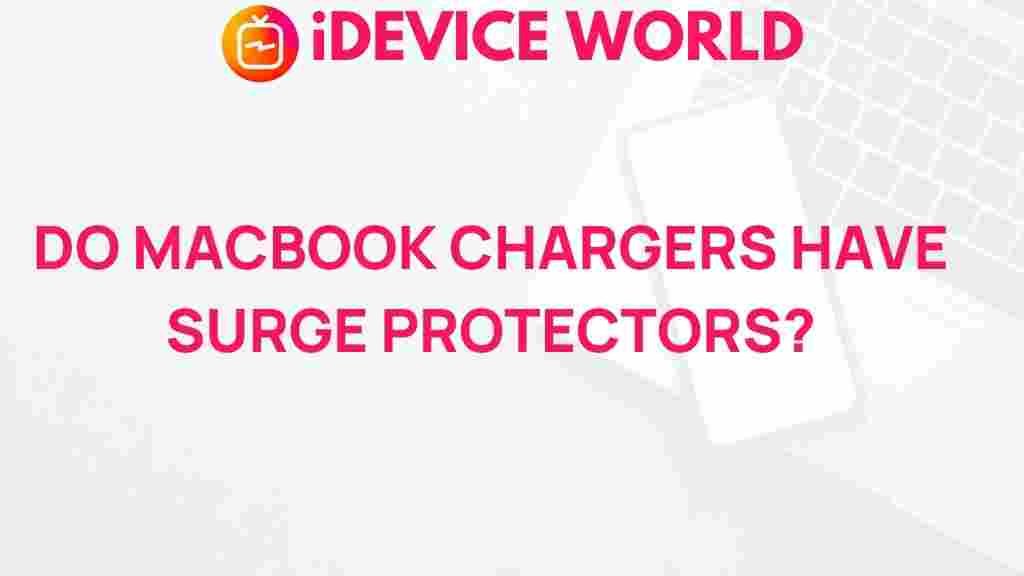Uncovering the Mystery: Do MacBook Chargers Come with Surge Protectors?
The MacBook has become a staple in the lives of many users, from professionals to students. As with any electronic device, the safety and longevity of your MacBook depend on how well it is protected from power surges. One question that often arises is whether MacBook chargers come equipped with surge protectors. This article delves into this topic, providing clarity on the protective features of MacBook chargers, how to safeguard your device further, and troubleshooting tips for common charging issues.
Understanding MacBook Chargers
MacBook chargers are designed specifically to provide optimal power to your device. They come in various wattages, depending on the model of your MacBook:
- MacBook Air: Typically 30W or 45W
- MacBook Pro 13-inch: Usually 61W
- MacBook Pro 15-inch: Generally 87W
- MacBook Pro 16-inch: Commonly 96W
Each charger is tailored to meet the power demands of its corresponding MacBook, ensuring efficient charging and performance.
Do MacBook Chargers Have Surge Protection?
To address the core question, MacBook chargers do not include built-in surge protectors. This means that while they are designed to provide a stable current to your MacBook, they do not inherently protect against voltage spikes that can occur during power surges.
Surge protection is a critical aspect of protecting electronic devices, including your MacBook. When a surge occurs—often due to lightning strikes, power outages, or faulty wiring—excess voltage can damage your device, leading to potential data loss or hardware failure.
Why You Should Consider External Surge Protection
Given that MacBook chargers lack built-in surge protection, it is essential to consider additional measures to safeguard your device. Here are some options:
- Surge Protector Power Strips: These devices can be plugged into your wall outlet and provide multiple outlets with surge protection.
- Uninterruptible Power Supply (UPS): A UPS not only offers surge protection but also provides battery backup in case of power outages.
- Dedicated Surge Protectors: Some products are specifically designed to protect a single device, which can be an effective choice for your MacBook.
Using an external surge protector will enhance your MacBook’s safety, especially in areas prone to electrical issues.
How to Choose the Right Surge Protector for Your MacBook
When selecting a surge protector, consider the following factors:
- Joule Rating: Look for a surge protector with a higher joule rating, which indicates better protection against surges.
- Response Time: A fast response time (measured in nanoseconds) ensures that your devices are protected more effectively.
- Number of Outlets: Ensure it has enough outlets for your needs, including room for future devices.
- Warranty: Some manufacturers offer warranties that cover connected devices; look for this added protection.
By investing in a quality surge protector, you can extend the lifespan of your MacBook and avoid costly repairs or replacements.
Step-by-Step Process to Set Up Surge Protection for Your MacBook
Setting up surge protection for your MacBook is a straightforward process:
- Select a Surge Protector: Choose a surge protector based on the factors mentioned above.
- Plug in the Surge Protector: Connect the surge protector to a wall outlet, ensuring it is firmly in place.
- Connect Your MacBook Charger: Plug your MacBook charger into one of the outlets on the surge protector.
- Connect Other Devices (Optional): If you have other devices, you can plug them into the surge protector as well.
- Power On: Turn on the surge protector (if it has a power switch) and ensure that your MacBook is charging properly.
Troubleshooting Common Charging Issues with Your MacBook
Even with the best surge protection in place, you may encounter charging issues with your MacBook. Here are some common problems and how to troubleshoot them:
- MacBook Not Charging: Check your charger for any visible damage. Try a different outlet or test another charger if available.
- Slow Charging: Ensure you are using the correct wattage charger for your model. A lower wattage charger will charge your MacBook more slowly.
- Charging Port Issues: Inspect the charging port for debris or damage. Cleaning it carefully can sometimes resolve the issue.
- Battery Not Recognized: Reset the SMC (System Management Controller) on your MacBook to resolve battery recognition issues.
If problems persist, consider contacting Apple Support or visiting an Apple Store for further assistance.
Conclusion
In conclusion, while MacBook chargers are built for efficiency and reliability, they do not come with built-in surge protectors. This makes it vital for MacBook users to invest in external surge protection to safeguard their devices from potential damage caused by power surges. By choosing the right surge protector and following the steps outlined above, you can ensure the safety of your MacBook and enhance its longevity.
For more information on protecting your devices, you can visit Apple’s official site. To learn more about charging and power management, check out our comprehensive guide here.
This article is in the category Reviews and created by iDeciveWorld Team
